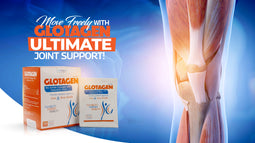
Introduction: Unveiling the Power of Collagen Peptides
As we age, our body's natural collagen production declines, leading to visible signs of aging like wrinkles, joint discomfort, and decreased skin elasticity. Enter collagen peptides—a form of collagen that's gaining popularity for its potential to combat these aging signs. But are they truly more effective than other collagen forms? Let's delve into the science and benefits of collagen peptides to find out.
What Are Collagen Peptides?
Also known as hydrolyzed collagen, collagen peptides, are short chains of amino acids derived from the breakdown of full-length collagen molecules. This hydrolyzation process makes them more bioavailable, meaning they're easier for the body to absorb and utilize. Unlike gelatin, which gels and is less soluble, collagen peptides dissolve easily in both hot and cold liquids, making them versatile for supplementation. (OnePeak Medical, Healthline)
Benefits of Collagen Peptides
Skin Health
Collagen peptides have been shown to improve skin hydration, elasticity, and reduce the appearance of wrinkles. A study published in Skin Pharmacology and Physiology found that women who took collagen peptides daily for eight weeks experienced significant improvements in skin elasticity compared to those who didn't. (Peptides Guide)
Joint Support
Regular intake of collagen peptides may alleviate joint pain and improve mobility, especially in individuals with osteoarthritis. Research indicates that collagen supplementation can stimulate cartilage regeneration and reduce inflammation in joints. (Peptides Guide)
Bone Health
Collagen is a major component of bones. Supplementing with collagen peptides can increase bone mineral density and strength, potentially reducing the risk of fractures. A study in Nutrients journal highlighted that postmenopausal women who took collagen peptides showed increased bone density after 12 months.(Cleveland Clinic)
Muscle Mass
Collagen peptides contribute to muscle mass maintenance. They provide essential amino acids necessary for muscle repair and growth, making them beneficial for older adults experiencing sarcopenia. (Cleveland Clinic)
Collagen Peptides vs. Gelatin: What's the Difference?
While both are derived from collagen, the primary difference lies in their processing and usability.(prlabs.com)
-
Gelatin: Partially hydrolyzed collagen that gels when cooled. Commonly used in cooking.(prlabs.com)
-
Collagen Peptides: Fully hydrolyzed collagen that doesn't gel, dissolves easily in liquids, and is more readily absorbed by the body.
For supplementation purposes, collagen peptides are generally preferred due to their superior solubility and absorption.
Marine Collagen vs. Bovine Collagen: Which Is Better?
Collagen peptides can be sourced from various animals, with marine and bovine being the most common.(YourBiology (UK))
-
Marine Collagen: Sourced from fish skin and scales, primarily contains Type I collagen, which is beneficial for skin, hair, and nails. It's known for higher bioavailability due to smaller peptide sizes. (YourBiology (UK))
-
Bovine Collagen: Derived from cow hides, contains both Type I and III collagen, supporting skin elasticity and joint health. It's widely available and often more affordable.(YourBiology (UK))
The choice between the two depends on individual health goals and dietary preferences.(Meo Nutrition)
How to Incorporate Collagen Peptides into Your Routine
Collagen peptides are versatile and can be added to:
-
Beverages: Mix into coffee, tea, or smoothies.
-
Foods: Stir into soups, oatmeal, or yogurt.
-
Baked Goods: Add to pancake or muffin batter.
For optimal results, a daily intake of 2.5 to 10 grams is recommended, depending on individual needs. (Verywell Health)
Dive Deeper into Collagen Science
Explore more insights into how collagen works and what makes it an essential part of your wellness routine:
-
The Science of Collagen: From Molecule to Miracle – Understand collagen at the molecular level and why it’s crucial for skin and joint health.
-
The Ultimate Natural Solution for Joint Support – Introducing Glotagen – Learn why Glotagen is becoming a top choice for joint comfort and anti-aging support.
-
Unlock the Power of Collagen: Your Guide to Pain-Free Joints & Wrinkle-Free Skin – A complete breakdown of collagen’s benefits for beauty and mobility, especially with Halal supplements.
Top Collagen & Joint Support Products to Try
Support your skin, joints, and overall health with these high-quality, halal-certified collagen supplements and joint care solutions:
-
Glotagen (Pure Collagen Supplement) – Your go-to solution for youthful skin, stronger joints, and healthier hair & nails.
-
Glotagen Wellness Bundle – A complete wellness combo to target aging signs inside and out.
-
Joint Support Collection – Explore our full range of products for joint health, mobility, and inflammation support.
-
PainGel Ointment – Fast-acting, natural relief for sore joints and muscles—perfect for pairing with internal collagen use.
FAQs
What does collagen do in the body?
Collagen provides structural support to skin, bones, tendons, and ligaments, maintaining their strength and elasticity.
Which foods are rich in collagen?
Bone broth, chicken skin, fish skin, and egg whites are natural sources of collagen.
Is collagen related to vitamin C?
Vitamin C is essential for collagen synthesis. It helps in the hydroxylation of collagen molecules, stabilizing their structure.
Is it good to take collagen every day?
Yes, daily supplementation can help maintain collagen levels, especially as natural production declines with age.
Conclusion: Are Collagen Peptides Worth It?
Considering their enhanced absorption, versatility, and scientifically backed benefits for skin, joints, bones, and muscles, collagen peptides stand out as a superior choice for those seeking to combat aging signs and support overall health. Incorporating them into your daily routine could be a proactive step towards maintaining vitality and well-being.
References:
-
Collagen Peptides – Benefits, Functions, and Uses in Health and Wellness. Peptides Guide(Peptides Guide)
-
Collagen vs. Gelatin: Which to Choose? Healthline(Healthline)
-
Bovine vs. Marine Collagen: Which Should YOU be Taking? Natural Force(Natural Force)
-
Do Collagen Peptides Actually Work? Cleveland Clinic(Cleveland Clinic)
-
5 Benefits of Collagen Peptides. Verywell Health(Verywell Health)




















